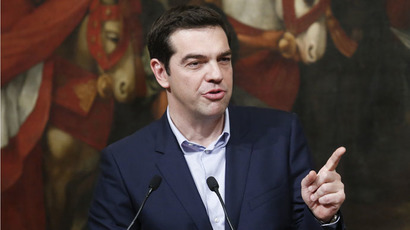Have The Russians Already Quietly Withdrawn All Their Cash From Cyprus?
Submitted by Tyler Durden on 03/25/2013 17:00 -0400
Yesterday, we first reported on something very disturbing (at least to Cyprus' citizens): despite the closed banks (which will mostly reopen tomorrow, while the two biggest soon to be liquidated banks Laiki and BoC will be shuttered until Thursday) and the capital controls, the local financial system has been leaking cash. Lots and lots of cash.
Alas, we did not have much granularity or details on who or where these illegal transfers were conducted with. Today, courtesy of a follow up by Reuters, we do.
The result, at least for Europe, is quite scary because let's recall that the primary political purpose of destroying the Cyprus financial system was simply to punish and humiliate Russian billionaire oligarchs who held tens of billions in "unsecured" deposits with the island nation's two biggest banks.
As it turns out, these same oligrachs may have used the one week hiatus period of total chaos in the banking system to transfer the bulk of the cash they had deposited with one of the two main Cypriot banks, in the process making the whole punitive point of collapsing the Cyprus financial system entirely moot.
From Reuters:
While ordinary Cypriots queued at ATM machines to withdraw a few hundred euros as credit card transactions stopped, other depositors used an array of techniques to access their money.
No one knows exactly how much money has left Cyprus' banks, or where it has gone. The two banks at the centre of the crisis - Cyprus Popular Bank, also known as Laiki, and Bank of Cyprus - have units in London which remained open throughout the week and placed no limits on withdrawals. Bank of Cyprus also owns 80 percent of Russia's Uniastrum Bank, which put no restrictions on withdrawals in Russia. Russians were among Cypriot banks' largest depositors.
So while one could not withdraw from Bank of Cyprus or Laiki, one could withdraw without limitations from subsidiary and OpCo banks, and other affiliates?
Just brilliant.
And if there was any doubt that the entire process of destroying one entire nation was simply to punish Cyprus, it can be completely cleared away now:
ECB officials contacted Latvia, another EU country that has received large Russian deposits, to warn authorities against taking in Russian money fleeing Cyprus, two sources familiar with the contacts said.
"It was made clear to our Latvian friends that if they want to join the euro, they should not provide a haven for Russian money exiting Cyprus," a euro zone central banker said.
If one thinks there is any material Russian cash therefore left in Cyprus with this epic loophole in place, we urge them to make a deposit in the insolvent nation. One person who certainly will not be allocating any of his money into Bank of Cyprus is German FinMin Schaeuble:
German Finance Minister Wolfgang Schaeuble said the bank closure had limited capital flight but that the ECB was looking closely at the issue. He declined to provide figures.
Perhaps because if he did, it would become clear that the only entities truly punished by this weekend's actions are not evil Russian billionaires, but small and medium domestic companies, and other moderately wealthy individuals, hardly any of them from the former "Evil Empire."
Companies that had to meet margin calls to avoid defaulting on deals were granted funds. Transfers for trade in humanitarian products, medicines and jet fuel were allowed.
The stealth withdrawals by Russians of course means that the two megabanks are now utterly drained of capital, and that the haircuts on those who still have unsecured deposits with the two banks will be so big it will likely mean a complete wipeout of all deposits. As in 0% recovery on your deposits!
In other words, by now any big Russian funds in Cyprus are long gone, and the only damage accrues to the locals: for one reason because their money over the critical EUR100K threshold has been "vaporized", and for another because the marginal driving force and loan demand creator in Cyprus, the Russians, are gone and are never coming back again.
This is what passes for monetary real-politik in the New Normal - an entire nation becomes collateral when pursuing a wealthy group of people. And the "wealthy group" is victorious in the end despite everything...
If we were Cypriots at this point we would be angry. Very, very angry.





 Reply With Quote
Reply With Quote Filip Singer/European Pressphoto Agency
Filip Singer/European Pressphoto Agency Yiannis Kourtoglou/Agence France-Presse — Getty Images
Yiannis Kourtoglou/Agence France-Presse — Getty Images Petros Karadjias/Associated Press
Petros Karadjias/Associated Press Yorgos Karahalis/Reuters
Yorgos Karahalis/Reuters






 Panos Kamenos, leader of the Independent Greeks party and defense minister of the coalition government Photo: Louisa Gouliamaki/AFP/Getty Images
Panos Kamenos, leader of the Independent Greeks party and defense minister of the coalition government Photo: Louisa Gouliamaki/AFP/Getty Images

Bookmarks